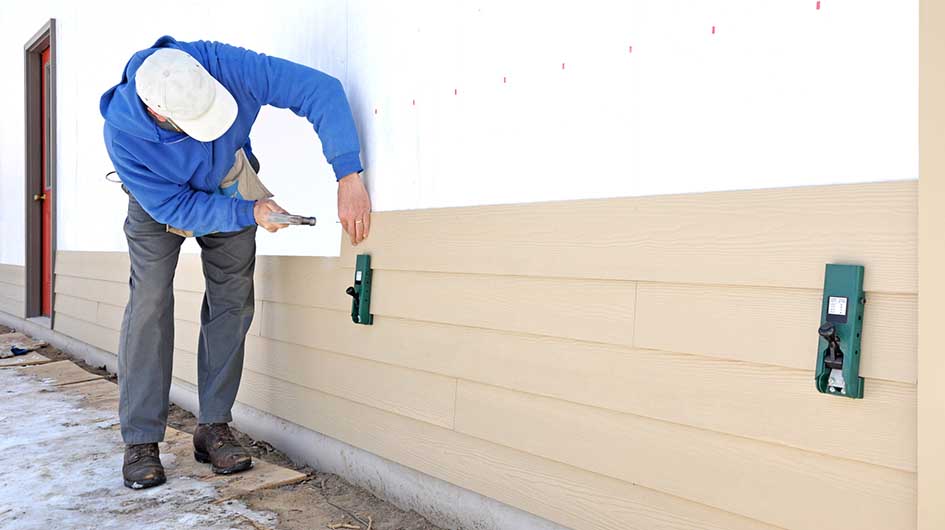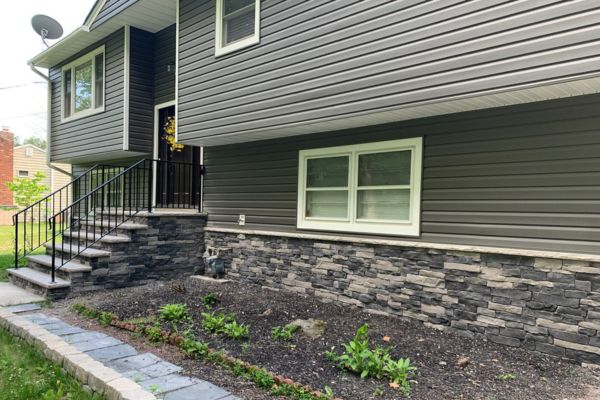Top-Rated Morris Siding Contractor Offering Expert Installation Services
Top-Rated Morris Siding Contractor Offering Expert Installation Services
Blog Article
The Vital Overview to the Various Kinds Of Exterior Siding and Their One-of-a-kind Benefits
In the world of home improvement, selecting the right siding is a vital choice that influences both visual charm and useful efficiency. With so several alternatives to think about, which home siding product genuinely stands out for your certain job?
Wood Siding
Wood siding, a popular selection for household outsides, uses a classic visual that integrates natural beauty with architectural stability. This exterior siding product is readily available in numerous styles, including clapboard, tiles, and board-and-batten, enabling property owners to tailor their façade to match their layout choices. Wood siding is commonly crafted from long lasting species such as cedar, redwood, or pine, which are recognized for their durability and capacity to stand up to environmental stress factors.
One of the key benefits of timber home siding is its outstanding insulation buildings, which can contribute to energy efficiency and reduced heating prices. Furthermore, timber exterior siding is biodegradable, making it an eco friendly alternative when sourced sustainably. Regular upkeep, including painting or discoloration, can extend its life-span and enhance its look, allowing house owners to maintain the natural beauty of the wood.
Nevertheless, possible drawbacks consist of sensitivity to insects, rot, and climate damage, requiring adequate treatment and upkeep - morris siding contractor. Regardless of these issues, when effectively cared for, wood house siding can provide a resilient and lovely solution that enhances the character of a home while using a warm, inviting atmosphere

Vinyl House Siding
Vinyl siding has actually become a leading selection for house owners seeking a low-maintenance exterior alternative that integrates sturdiness and affordability. This functional material is crafted from polyvinyl chloride (PVC), making it immune to different weather condition conditions, consisting of moisture and UV rays. Consequently, vinyl house siding does not warp, rot, or fade, making sure lasting visual appeal.
Among the primary benefits of plastic home siding is its comprehensive variety of colors and designs, enabling property owners to achieve the preferred try to find their building without the need for regular repainting. Additionally, vinyl home siding is easy to set up, which can dramatically decrease labor expenses throughout construction or remodelling tasks.
Plastic exterior siding likewise adds to power efficiency. Numerous alternatives attribute insulation backing, which enhances thermal performance, assisting to preserve comfy indoor temperature levels and potentially lowering energy expenses. Its smooth surface helps with simple cleaning, requiring only periodic washing with a garden hose pipe to eliminate dirt and debris.
Fiber Concrete House Siding
Fiber concrete home siding has obtained traction among contractors and property owners alike due to its remarkable combination of sturdiness and aesthetic adaptability. Composed of a mixture of concrete, cellulose, and sand fibers, this house siding alternative is crafted to stand up to extreme weather, consisting of high winds, hefty rain, and temperature variations, making it a durable option for domestic outsides.

Among the main advantages of fiber cement siding is its resistance to bugs, such as termites, and its non-combustible nature, offering enhanced fire safety. morris siding contractor. In addition, it is offered in a wide variety of colors, designs, and textures, allowing house owners to achieve their preferred visual without giving up performance
An additional benefit is its reduced upkeep requirements; fiber concrete home siding generally needs paint or staining every 5-10 years, which is less constant than other materials. Moreover, its long life adds to a lower general price of ownership, as it minimizes the demand for frequent repair work or replacements.
Eventually, fiber cement siding stands for an excellent financial investment for those looking for a durable, attractive, and versatile exterior alternative, incorporating both type and feature to enhance the home's visual appeal.
Metal House Siding
The attraction of metal exterior siding hinges on its durable toughness and modern Recommended Reading aesthetic charm, making it a preferred choice for modern design. Readily available in materials such as light weight aluminum and steel, metal siding uses an array of coatings and colors, permitting house owners to accomplish a personalized appearance that matches their style vision.

Power efficiency is another significant advantage, as lots of metal home siding items are made with insulation alternatives that aid regulate indoor temperature levels. This can lead to reduced energy costs over time. Additionally, metal exterior siding is commonly recyclable, making it an eco pleasant selection for sustainability-minded homeowners.
The setup procedure for steel home siding can be fairly simple, resulting in a quicker turnaround time for construction projects. Overall, steel house siding incorporates performance and design, making it a functional choice for those seeking a long-lasting and aesthetically enticing outside surface.
Brick and Stone House Siding
Brick and stone exterior siding stands apart as a timeless option that improves the aesthetic appeal of any home. Understood for their resilience see this website and low upkeep, these products give an extraordinary roi while elevating the home's curb allure. Offered in various colors, appearances, and patterns, brick and rock can be tailored to match diverse building styles, from typical to modern-day.
Among the primary advantages of block and rock exterior siding is their power effectiveness. Both products possess natural protecting residential properties that help regulate indoor temperatures, potentially decreasing cooling and heating expenses. In addition, they offer exceptional fire resistance compared to other exterior siding choices, contributing to enhanced safety.
One more advantage is their longevity. Block and stone can last for decades, typically calling for marginal maintenance past occasional cleaning. Unlike wood home siding, they are unsusceptible parasites and rot, ensuring a long-lasting exterior that endures the aspects.
Conclusion
In recap, the choice of exterior siding dramatically affects a home's aesthetic allure, power performance, and maintenance requirements. Each type of siding-- whether timber, vinyl, fiber steel, cement, or block and rock-- offers one-of-a-kind benefits customized to various home owner preferences and ecological conditions.
One of the main benefits of wood siding is its exceptional insulation residential or commercial properties, which can add to power efficiency and lower home heating costs. In addition, wood house siding is biodegradable, making it an ecologically pleasant option when sourced sustainably.One of the main advantages of metal home siding is its resistance to numerous environmental aspects.Power efficiency is one more significant benefit, as numerous steel siding products are made you can try this out with insulation options that help control interior temperature levels. Each kind of siding-- whether timber, vinyl, fiber steel, block, or cement and rock-- uses unique benefits tailored to numerous home owner preferences and environmental conditions.
Report this page